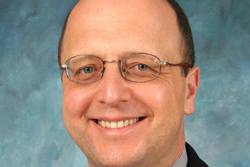 |
Pierre Fayad, M.D. |
Called the IRIS (Insulin Resistance Intervention after Stroke) Trial, the study is unique because it targets insulin resistance, which affects nearly half of all patients who have had an ischemic stroke or transient ischemic attack (TIA).
“The IRIS Trial represents the first therapy specifically directed at treating the metabolic problem in stroke patients,” said Walter Kernan, M.D., professor of medicine at Yale University School of Medicine and the principal investigator on the study. “We are using a drug that we believe can control insulin resistance and prevent stroke survivors from having a recurrent stroke or heart attack.”
Novel use for diabetes drug
The study aims to determine the effectiveness of the drug, pioglitazone (trade name Actos), in insulin resistance control. Pioglitazone is an FDA-approved drug used by millions of diabetes patients around the world.
Dr. Kernan delivered a grand rounds talk last week for the UNMC Department of Neurological Sciences. UNMC is one of about 90 participants in the IRIS Trial. Pierre Fayad, M.D., the Reynolds Centennial Professor and chairman of the UNMC Department of Neurological Sciences, is the local principal investigator at UNMC, which is the only research site in Nebraska.
More than 1,700 patients have been enrolled in the study over the past four years, Dr. Kernan said, and he hopes to enroll a total of 3,136 patients by the end of 2010. Patients from the United States, Canada and Israel are currently enrolled in the IRIS Trial, he said, and he plans to add patients from Australia, England, Germany, Italy and China later this year.
UNMC a leading participant
|
Eligible participants must:
- Be 39 years or older;
- Have experienced an ischemic stroke or TIA in the past six months; and
- Be non-diabetic, but have insulin resistance as determined by a special blood test.
The study is randomized with half the participants given pioglitazone and the other half given a placebo. Participants will be followed for an average of four years.
Study protocol
IRIS participants will start by taking one pill daily containing 15 mg of pioglitazone or placebo. The dose will gradually be increased to three pills or 45 mg of pioglitazone or placebo daily. Pioglitazone can be taken with or without food and with or without other medications.
A number of drugs that can reduce the risk of strokes and heart attacks, including:
- Aspirin and other agents used as blood thinners;
- Statins to lower cholesterol; and
- Blood pressure lowering medications to treat hypertension.
If this drug (pioglitazone) does work to control insulin resistance, it should give physicians another means of reducing recurrent strokes or heart attacks, Dr. Fayad said.
Insulin resistance
Insulin resistance is a common condition that affects about one of every four people. It is especially common in people who are older, inactive or overweight. Insulin resistance has recently been determined to cause atherosclerosis, the underlying disease that clogs vessels in strokes and heart attacks.
People who are insulin resistant are unable to efficiently metabolize sugar, the key energy source for the body. Pioglitazone allows these individuals to better metabolize sugar.
Study receives major support
The IRIS Trial is funded by the National Institute of Neurological Disorders and Stroke (NINDS), one of the divisions of the National Institutes of Health (NIH). It was originally funded for five years and $28 million. It was recently renewed for another five years and about $20 million, Dr. Kernan said.
He anticipates that the study will conclude in 2014 and results will then be published in a major scientific journal.
Although the cost of the trial is high, Dr. Kernan said the benefits derived could far exceed the cost.
“If the drug reduces the number of recurrent strokes, it will result in huge cost savings in addition to a tremendous reduction in patient suffering,” he said. “The benefits will be felt not only in the United States but across the world.”